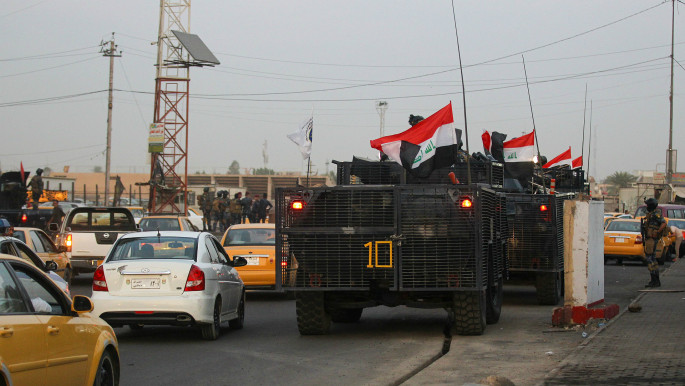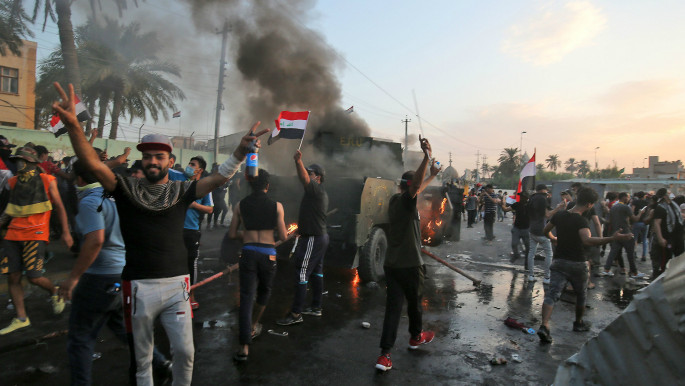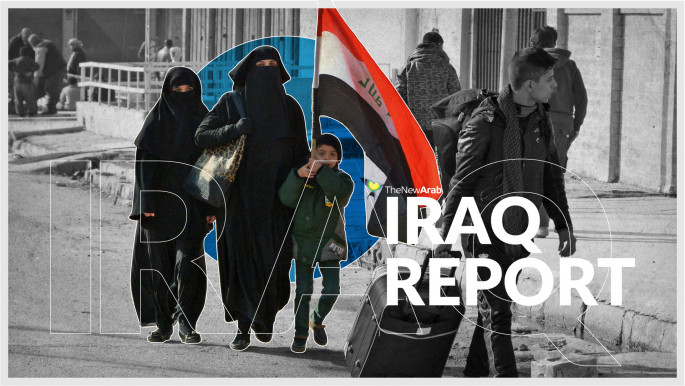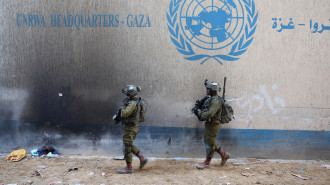The Iraq Report: Iraq security sources confirm Iran-backed militias killing protesters
Although coverage of the ongoing protests in Iraq has been muted globally due to domestic as well as international factors, Iraqi security sources have for the first time confirmed what many already suspected – pro-Iran Shia militias were actively and unilaterally killing peaceful protesters.
Demonstrators have been consistently hitting streets in Iraq’s central and southern provinces since the start of the month and have continued demands for a complete overhaul of the political system despite facing a brutal crackdown.
Human Rights Watch has also warned against the transfer of Islamic State (IS) group prisoners to Iraq due to the lack of a fair and transparent judicial system in the country.
This news also comes as France and Iraq appear to be close to working out a deal whereby IS prisoners would be put on trial in Iraq but perhaps under some kind of international supervision under a framework that may exclude the death penalty, banned by all European Union members states.
Shia militants actively gunning down protesters
Shia militant groups close to Iran’s Iranian Revolutionary Guard Corps (IRGC) have been actively involved in killing Iraqi demonstrators according to two Iraqi security officials interviewed by Reuters on Thursday.
 |
|
| Read also: Deadly protests engulf Iraq, but what has ignited this rage? |
According to the report, these militias are not only connected to the IRGC but are also part of the Popular Mobilisation Forces (PMF), or Hashd al-Shaabi in Arabic. Militants have deployed snipers onto city rooftops and they have been using lethal force to quell protests against the one-year-old government of Prime Minister Adel Abdul Mahdi.
The PMF are an Iran-backed but Iraq-sanctioned umbrella organisation bringing mostly Shia militias together to form a more powerful unified military unit.
While technically under the command of the prime minister, the PMF operates on its own initiative and its interests are represented in parliament via the Conquest Alliance, a bloc of fundamentalist Shia Islamist factions.
Reuters also reported a security source as saying that the PMF had entrusted its head of security, Abu Zainab al-Lami, to take charge of operations to suppress the protests. While the PMF deny involvement in the brutal crackdown, Iraq’s interior ministry denied they had directly fired at protesters and instead blamed unnamed "vicious" gunmen, likely a reference to militia groups.
The interior ministry’s statement is itself contradictory of a later statement by the Iraqi security forces where they accepted that excessive force had been used against demonstrators and that "individuals responsible" for using excessive force would be held accountable.
While previously unreported, it has long been suspected that hardline Shia militants loyal to Iran have been actively involved in the suppression of protesters. This would not be surprising as these militias also directly aided in the quelling of protests in Basra in 2018, as well as in other Iraqi cities where their headquarters and buildings were targeted by angry demonstrators.
 |
It has long been suspected that hardline Shia militants loyal to Iran have been actively involved in the suppression of protesters |  |
Making matters worse is that there has been great difficulty in reporting from the frontlines of the protest sites because journalists have been targeted by masked gunmen believed to be Shia militants. Eight television networks were targeted by the masked men, with one eyewitness reporting that employees of a television station had been beaten and had their wallets and phones stolen before the gunmen destroyed their broadcasting equipment and left.
All of the networks that were attacked had aired footage of the protests on national and international stations, and many broadcasters reported receiving death threats. These attacks against media professionals are obviously designed to be an effective tool to silence coverage and to ensure brutality by Shia militants and the Iraqi security forces are not covered, giving them free reign to crush peaceful demonstrators.
Twitter Post
|
The attacks on protesters and journalists by Iran-backed militants can perhaps be linked to Iran’s Supreme Leader Ali Khamenei’s tweet where he accused "enemies" of trying to conspire to sow discord between Iran and Iraq. Considering the close ties between the IRGC and the Iraqi security forces and militias, it is therefore unsurprising that they would try to act on Khamenei’s message that the protests are a "conspiracy".
Iraq launches inquiry into protester deaths
But Iraqi misgivings about Iranian interference and involvement have a lot of credence and ought to be taken seriously by both Iraqi officials and Iranian kingmakers. After all, it cannot be surprising that Iraqis would be angry at the fact that they are being killed, beaten and tortured by those connected to or acting on behalf of Iran.
While skirting around directly blaming Iran, Grand Ayatollah Ali Sistani – Shia Islam’s highest religious authority and an Iranian himself – last Friday blamed the Iraqi government for the deaths of protesters and demanded a full investigation.
Addressing the faithful in his weekly sermon that is read out by his agents, Sistani gave the Iraqi government "two weeks" to investigate who was responsible for killing protesters and to bring them to justice.
He also called on authorities to "put an end to threats, beatings, abductions, sniper fire and violence by those who believe they can act with total impunity", a message seen as being directed to government-aligned but Iran-sponsored Shia militants.
A day after Sistani’s sermon, the Iraqi government announced that it would ramp up its schedule to probe the bloodshed and initially blamed "unidentified snipers" who now appear to be directly linked to IRGC proxies in Iraq.
Arrest warrants for 13 security forces personnel were issued on Wednesday this week, where they are expected to face allegations of using excessive force.
Iraqi authorities have come under fire for their slow response to the mounting protester death toll and, as of yet, no new figures have been disclosed since early October despite the violence continuing.
"For more than a decade, Iraqi governments have said they would investigate abuses by security forces but haven't done so," said Sarah Leah Whitson, Middle East director at Human Rights Watch, in a statement.
Amnesty International – which said it interviewed eight activists and journalists who described seeing protesters killed by snipers – urged authorities to properly investigate the "use of excessive and deadly force".
Security forces did not protect protesters from sniper fire, Amnesty said, "nor have police intervened and arrested anyone responsible for firing at demonstrations."
 |
|
| Read also: The Iraq Report: Iraq ablaze as protesters defy curfews leaving dozens dead |
While arrests have now been made, this is likely to fall far short of protesters’ expectations of justice as it is improbable that just over a dozen men could have killed 106 protesters in the first six days alone, and they are also not highly ranked enough to have issued kill orders without the knowledge of the chain of command.
Foreign IS fighters could be tried in Iraq
French Foreign Minister Jean-Yves Le Drian on Wednesday said he would discuss a judicial framework for putting members of Islamic State group on trial during an upcoming visit to Iraq, as calls grow for an international court to judge the extremists.
The news comes amid worries from the international community that Turkey's deadly offensive into northern Syria could lead to the resurgence of IS militancy in the region.
"We need to work things out with the Iraqi authorities so that we can find a way to have a judicial mechanism that is able to judge all these fighters, including obviously the French fighters," he told BFM-TV, without specifying when he would go to Baghdad.
Seven European countries – France, the UK, Belgium, Germany, the Netherlands, Sweden and Denmark – have during the last months been discussing setting up an international court in Iraq for putting foreign IS fighters on trial.
Officials from all seven countries took part in a technical mission to Baghdad to assess the situation.
According to the Kurdish administration in northeastern Syria, around 12,000 IS suspects are held in prisons across the area. Around 2,500 of them are non-Iraqi foreigners.
Many European governments have been reluctant to repatriate these prisoners to stand trial and have already transferred some to Iraq to be prosecuted.
"Given Iraq's record of unfair trials, European states should not promote efforts to have their nationals transferred there for prosecution," HRW's Iraq researcher Belkis Wille said.
Any government supporting such a move "without taking measures to remove the risk of torture, sham trials and execution risks contributing to serious abuses," she said.
Wille said her organisation's monitoring showed that trials in Iraq were "inherently unfair and replete with due process violations."
She urged the UK, Denmark, France, Germany and other countries to seek their nationals' repatriation instead.
Any attempt to hold IS fighters to account for their crimes in a way that is deemed to be unjust and simply handing them over for the Iraqi judicial system to execute will potentially be deemed a victory for IS who can use their deaths to not only lionise new "martyrs" but also to highlight the hypocrisy of Western democracies in the application of their own principles.
The Iraq Report is a fortnightly feature at The New Arab.
Click below to see the full archive.
 |

![Palestinians mourned the victims of an Israeli strike on Deir al-Balah [Getty]](/sites/default/files/styles/image_684x385/public/2024-11/GettyImages-2182362043.jpg?h=199d8c1f&itok=xSHZFbmc)


![The law could be enforced against teachers without prior notice [Getty]](/sites/default/files/styles/image_684x385/public/2178740715.jpeg?h=a5f2f23a&itok=hnqrCS4x)


